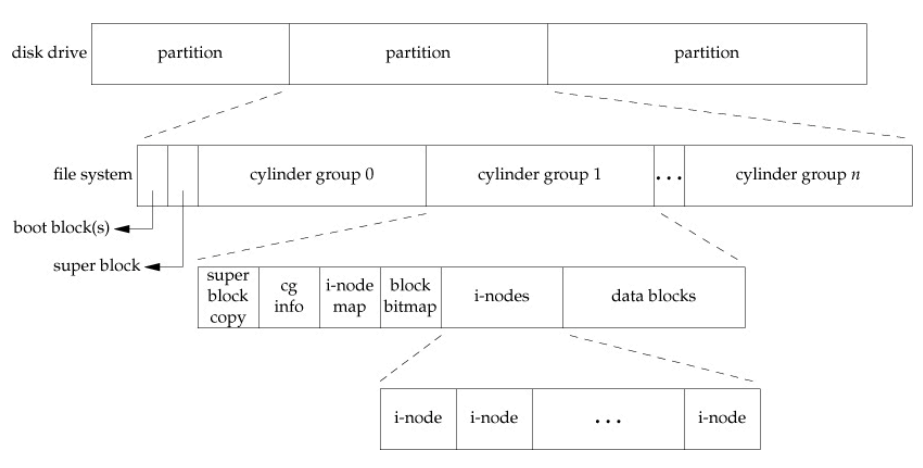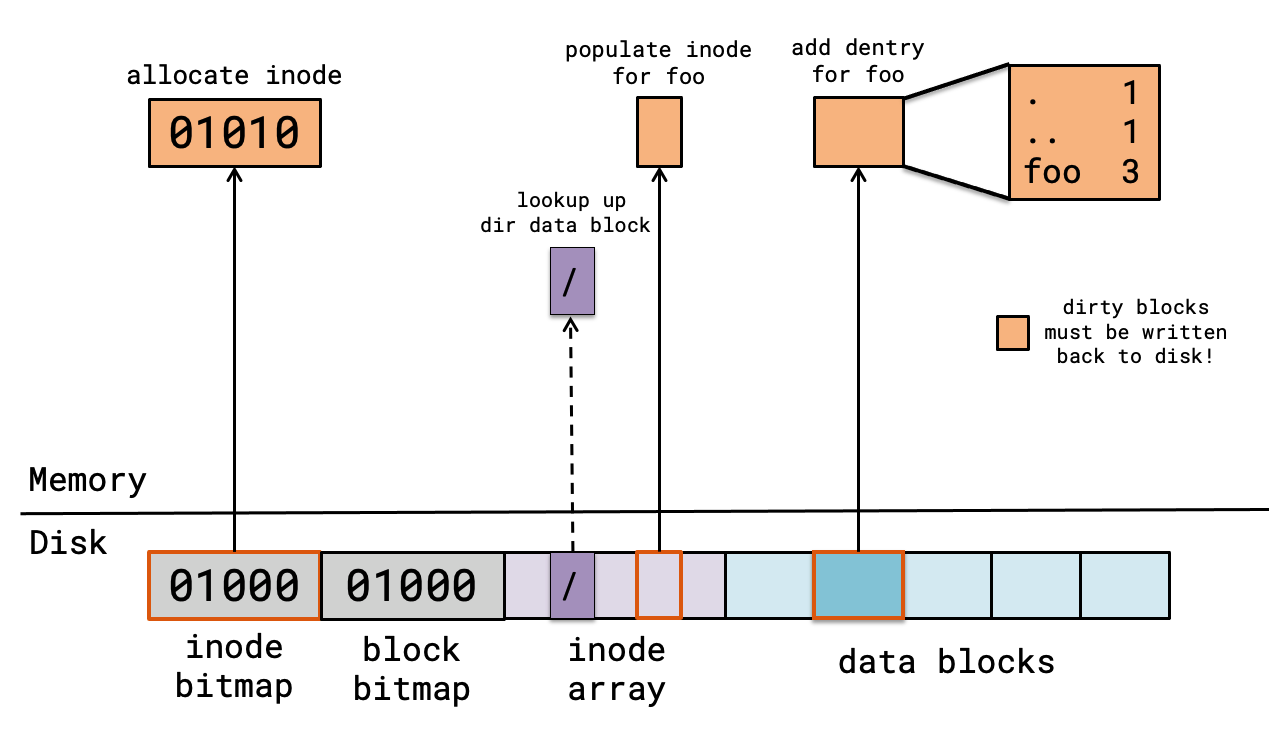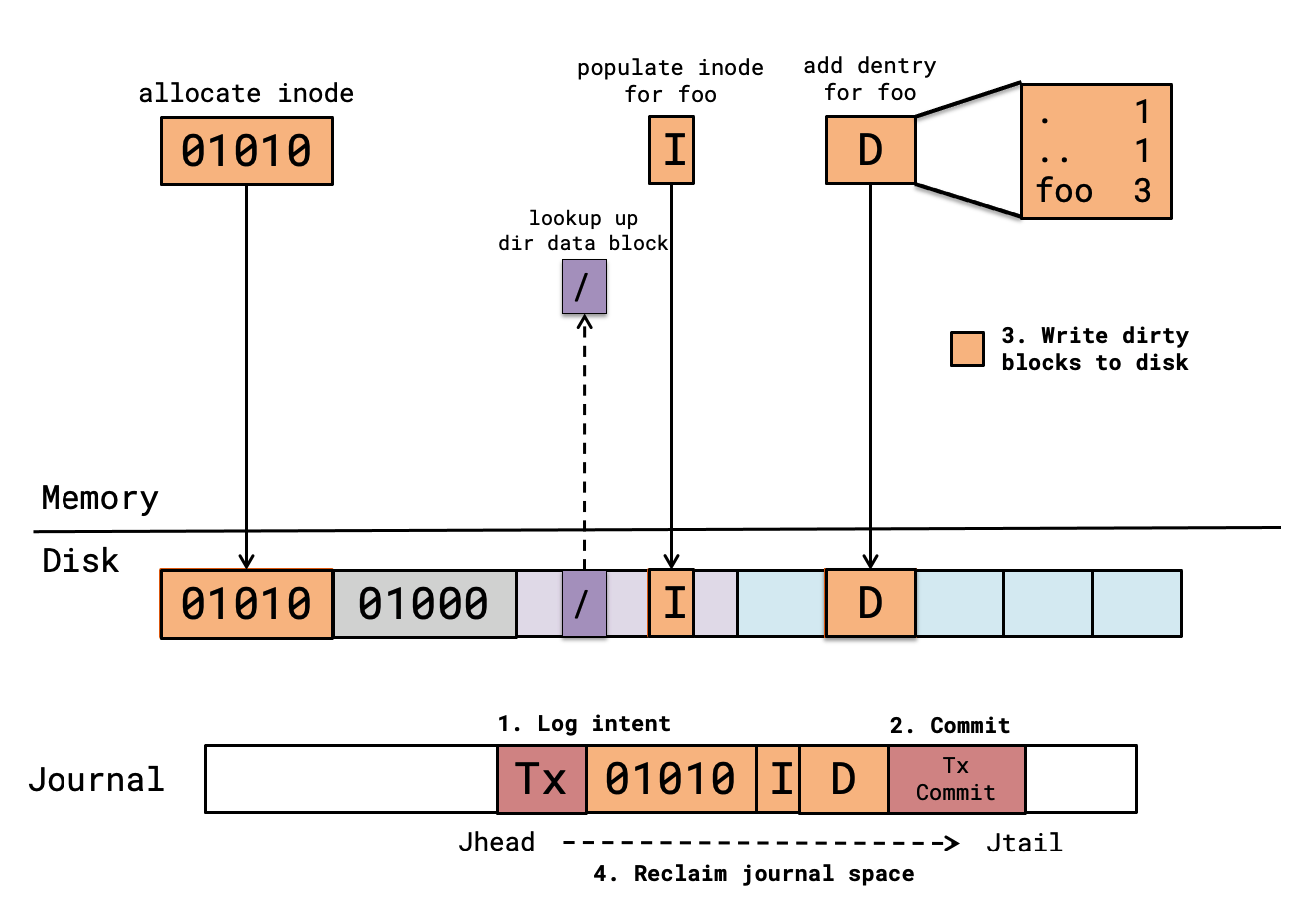COMS W4118 Operating Systems I
Journaling
The Consistent Update Problem
Motivation: non-atomic updates
Recall FFS disk layout:

Writes require several steps:
- Update inode/block bitmaps
- Update inode
- Update data blocks
What if the system crashes between any of these steps? Disk only provides atomic writes one sector at a time… the data structures may not all be within the same sector. Like race conditions in concurrent programs, but can’t lock out a failure with a lock :(
Example: ext2 file creation
ext2 is a port of FFS. Say that we currently have a small ext2 partition with just one empty directory in it.
In order to create a new empty file foo in filesystem, we read three pieces of
the filesystem into memory and mutate them:
- inode bitmap: allocate a new inode for
foo - inode: populate an inode for
fooin the inode array - data block: add a dentry for
fooin the directory’s data - no need to allocate a data block for empty file
fooyet

Let’s analyze possible crash scenarios. Define B, I, D as follows:
- inode bitmap update (B)
- add inode for
foo(I) - add dentry for
footo dir data block (D)
And define the contents for these updates as follows:
B = 01000 ---> B' = 01010
I = garbage ---> I' = initialized
D = {., ..} ---> D' = {., .., foo}
Any subset can be written out to disk!
B I D ---> Consistent (new data lost)
B' I D ---> Inconsistency! Bitmap says I was allocated,
but no one is using it (leak)
B I' D ---> As if nothing happened! we wrote to the inode
but map still says its garbage
B I D' ---> SERIOUS PROBLEMS: dentry exists, but points to garbage inode.
bitmap says that inode is free, can be taken by another file.
B' I' D ---> Inconsistency! Bitmap says I was allocated, and we wrote to I,
but no one uses I.
B' I D' ---> MOST SERIOUS PROBLEM! FS is consistent according to bitmap and
dentry, but inode has garbage data.
B I' D' ---> Inconsistency! Dentry refers to valid I, but bitmap says I is free.
I can be taken by another file.
B' I' D' ---> Consistent (new data persisted)
In these crash scenarios, data loss isn’t the primary concern – we care more about filesystem consistency. Ruining data structures makes the fs unusable!
fsck: file system consistency check
- in the old days, reboot after crash and scan entire disk to make fs consistent.
- disadvantages:
- slow to scan large disk
- cannot correctly fix all crash scenarios (e.g.
B' I D'). - no well-defined consistency (e.g. what do we do for
B I D'?)
Journaling
Concept: write-ahead logging
Persistently write intent to log/journal, then update filesystem
- crash before intent is committed: noop
- crash after intent is committed: replay op
Better than fsck:
- no need to scan entire disk
- well-defined consistency
Example: ext3 physical journaling
Let’s first write all of the block updates to the journal and then update the file system:
- Commit dirty blocks to journal as one transaction
- Write commit record (finalize journal entry)
- Write dirty blocks to real file system
- Reclaim journal space for transaction (we don’t need it anymore)

If you crash after committing to the log, just replay changes from the log!
This was an example of physical journaling, as oppposed to logical journaling, where we write a logical record of the operation to the log:
- Complex to implement, but may be faster and save disk space
Journaling Write Orders
- Journal writes, then FS writes
- otherwise, crash will leave FS inconsistent but no journal record to patch it up
- FS writes, then reclaim journal space
- otherwise, if you crash before you finish the FS write, the journal record to patch it up will already be gone!
- Journal writes, the commit record, then FS writes
- we need the commit record to tell us that we journaled the entirety of the change. Otherwise, the journal may have garbage in it!
ext3 Journaling Modes
Motivation: journaling is expensive. Every FS write requires two disk writes, two seeks. Balance consistency and performance…
- Data journaling: journal all writes, including file data
- Problem: expensive to journal data
- Metadata journaling: journal only metadata
- Used by most FS (IBM JFS, SGI XFS, NTFS)
- Problem: file may contain garbage data
- Ordered mode: write file data to FS first, then journal metadata
- Default mode for ext3
- Problem: if crash before writing metadata, then you end up with old file metadata and new file data, where the journal says everything is OK
Last updated: 2023-04-08